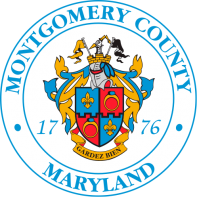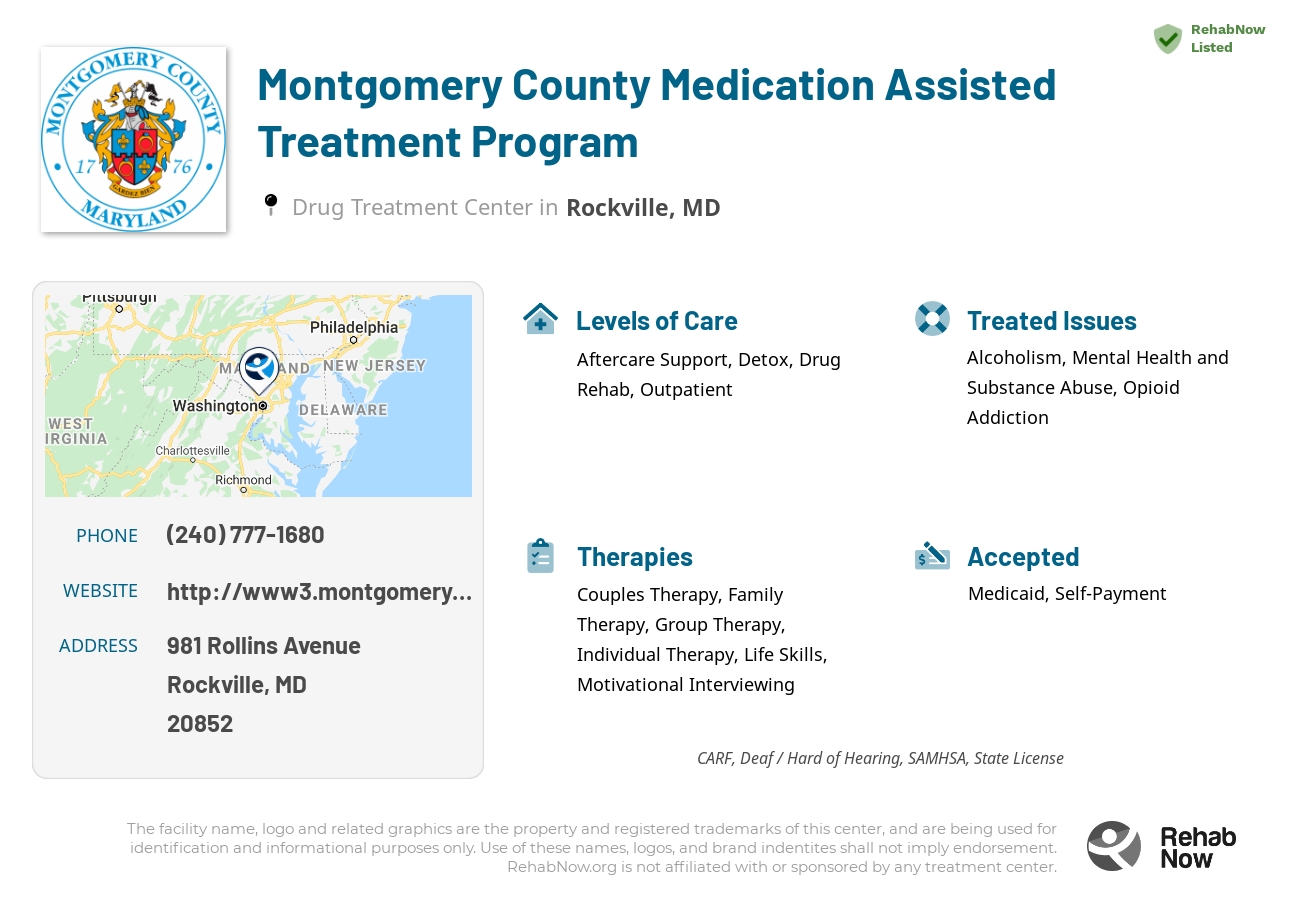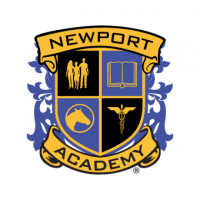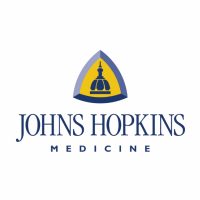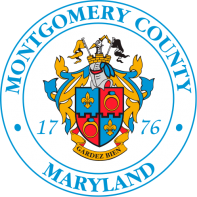Montgomery County Medication Assisted Treatment Program
Drug Rehab Center in Rockville, Maryland
The Montgomery County Medication Assisted Treatment Program is a highly-regarded treatment center in Rockville, Maryland, providing specialized care and support for all levels of addiction through their individualized detoxification and aftercare programs, accredited by CARF, SAMHSA and the state.
About Montgomery County Medication Assisted Treatment Program in Maryland
Montgomery County Medication Assisted Treatment Program, situated in Rockville, Maryland, is a private rehab facility dedicated to helping individuals overcome alcoholism, drug addiction, mental health issues, and opioid addiction. With a history of providing comprehensive care, the program focuses on delivering personalized treatment plans tailored to each client's unique needs.
• CARF, SAMHSA, and State License accredited, ensuring high-quality care
• Specializes in treating alcoholism, dual diagnosis, opioid addiction, and drug addiction
• Offers a safe and supportive environment for detoxification and recovery
• Provides a range of outpatient treatment options for those not requiring residential care
Montgomery County Medication Assisted Treatment Program holds accreditations from CARF, SAMHSA, and maintains a State License, demonstrating their commitment to providing top-notch care. Their team of experienced professionals works diligently to create individualized treatment plans that address each client's specific challenges and goals.
The program treats a wide range of addictions, including alcohol, opioids, and various drugs. They also provide care for individuals with dual diagnoses, addressing both substance abuse and mental health concerns. Treatment methods include detoxification, outpatient care, drug rehabilitation, and aftercare support, ensuring a comprehensive approach to recovery.
Genders
Ages
Modality
Additional
Accreditations
State License
SAMHSA

CARF
The Commission on Accreditation of Rehabilitation Facilities (CARF) is a non-profit organization that specifically accredits rehab organizations. Founded in 1966, CARF's, mission is to help service providers like rehab facilities maintain high standards of care.
Conditions and Issues Treated
Opioid addiction treatment should be done in a medically supervised drug rehab. While taking opioids, users will typically use other substances to enhance the effects of opioids or to reduce the adverse effects of opioid use. Opioid addiction treatment will include detoxification and drug rehab counseling to help both the user and their loved ones learn how to live a successful sober lifestyle.
Treatments such as methadone, buprenorphine, and naltrexone are three medications that can help treat opioid addiction. These drugs work on the brain’s pleasure center and reduce cravings and the effects of illicit opioids such as heroin. These drugs can be either given orally or by injection. Individual drug rehab counseling sessions can be helpful to discuss any questions or concerns with the drug treatment program. This counseling will also help the user set goals for when they finish drug rehab.
Opioid addiction recovery is a long process. Many of the changes to the brain caused by opioid use cannot be undone, but with time and the proper treatment, a person can return to normal function. After detox, treatment will include drug rehab counseling and entering a halfway house or sober living community. Aftercare is critical to long-term recovery, as it helps the user avoid relapsing and entering back into drug rehab.
Levels of Care Offered
This center offers a variety of custom treatment tailored to individual recovery. Currently available are Aftercare Support, Detox, Drug Rehab, Outpatient, with additional therapies available as listed below.
An addict may have to go through alcohol or drug withdrawal. While detox may be uncomfortable, it is not life-threatening. Detoxification allows the addict to rid the body of all traces of drugs or alcohol and gives the addict a clean slate for their recovery. In an inpatient or outpatient setting, detox can be managed medically.
“Outpatient treatment is ideal for those who have a lower intensity addiction. It’s also suitable for those with a supportive environment and those on a tight budget.
Outpatient treatment can be considered the lowest intensity level of addiction treatment. It is ideal for early phase addiction or lower intensity addictions. It may involve weekly sessions instead of daily. Peer group support, 12-step programs, and individual counseling may still be used and anti-addiction medication.
Aftercare support is vital to those who have completed a drug or alcohol treatment program. This support comes in individual and family counseling, treatment of psychiatric and other medical conditions, and medications to reduce cravings. It helps recovering addicts adjust to normal day-to-day activities and can last for a year or longer.
The majority of drug and alcohol addicts who receive aftercare treatment do not relapse. It is estimated that without aftercare, the relapse rate will be between 70 to 90 percent for most people. Aftercare is the final stage in addiction recovery, but it will also help maintain sobriety if relapse does occur.
Therapies & Programs
No single treatment works for all addicts; therefore, the goal of treatment and therapy should be to find what works best for each individual. Some people requiring addiction treatment may only need a few weeks of inpatient care. Others will require long-term residential care. Tolerance and withdrawal levels vary from person to person and thus affect the intensity of the treatment needed.
If an individualized approach to treatment and therapy is not offered, addicts may fail to reap benefits from their efforts. Professionals must customize plans according to their patient’s needs, limitations, and strengths. The goal of all forms of addiction treatment should be for addicts to find healthy ways to cope with their addiction and its underlying causes.
Couples therapy for drug addiction is a unique form of therapy that allows family members to work through the emotional issues of their loved one’s addiction together. Family members can support each other while learning how to cope with the addiction and encourage healthy changes.
Accordingly, couples therapy for drug addiction is designed for an addict and their significant other or spouse. The two will work with a therapist to learn how the addiction affects themselves and the relationship and how to break the negative patterns of behavior that may have developed.
Drug addiction can destroy a person’s life, as well as their family and friends. The loss of one’s ability to choose how to live and behave often leads the addict into depression, anger, guilt, and many emotional problems.
The therapies usually include siblings, children, and parents who are involved in their daily lives. These sessions are vital because they address past issues that may have hampered an addict’s or alcoholic’s recovery and provide support at a crucial time!
One of the most critical aspects of family therapy is helping addicts’ loved ones see their situation in a new light. It’s also one of the most challenging things a family can do when a loved one struggles with addiction or alcoholism.
Group therapy is held in a safe, controlled setting where patients can feel comfortable sharing their struggles and gaining perspective through shared conversations. It takes place in a group rather than one on one to prevent feelings of isolation or being unique in their situation while creating an environment for addicts at Montgomery County Medication Assisted Treatment Program to develop fellowship, accountability, and support. Group therapy is an important tool in recovery that prevents cravings that prompt a return to active addiction.
Cognitive-behavioral therapy is a talking-based method that helps people struggling with addiction replace destructive behaviors with healthier ones. CBT also helps them identify the underlying thoughts and beliefs that cause these behaviors in the first place and ways to control those thoughts and feelings. It can be administered as a holistic therapy or as part of combination therapy and—as opposed to turning to drugs and alcohol—helps addicts learn how to respond to negative thoughts instead.
Life skills training is beneficial for addicts in recovery because it helps them learn how to take care of themselves and improve their quality of life, which can promote feelings of purpose and motivation.
This type of treatment works by teaching individuals life-enhancing skills that support positive living, including:
- Healthy lifestyle habits
- Skills to effectively manage stress
- Effective communication skills to help them get their needs met without turning to drugs or alcohol
- Money management and budgeting skills so they can continue to take care of themselves after treatment ends.
Payment Options Accepted
For specific insurance or payment methods please contact us.
Montgomery County Medication Assisted Treatment Program Associated Centers
Discover treatment facilities under the same provider.
No items foundLearn More About Montgomery County Medication Assisted Treatment Program Centers
Additional Details
Specifics, location, and helpful extra information.
Rockville, Maryland 20852 Phone Number(240) 777-1680 Meta DetailsUpdated April 15, 2024
Staff Verified
Montgomery County Medication Assisted Treatment Program Patient Reviews
There are no reviews yet. Be the first one to write one.
Rockville, Maryland Addiction Information
For the past decade, Maryland's rate of drug use and abuse has significantly increased. The overdose rate is currently higher than the national average. This epidemic is due to the many industries where manual labor is required. As soon as prescription opioids were more readily accessible a large part of manual workers started using–and eventually abusing–the painkillers.
The drug addiction problem in Rockville, Maryland, is quite bad. There are more than 1,000 people in the city who are addicted to drugs. The 12-month prevalence for illicit drug use is 7%. Rockville, Maryland, is a great place to get sober and live a healthy life. There are many alcohol and drug rehabs in the area and support groups and 12-step programs to help you in this regard.
Treatment in Nearby Cities
- District Heights, MD (18.5 mi.)
- Barstow, MD (45.7 mi.)
- Thurmont, MD (42.2 mi.)
- Pasadena, MD (29.5 mi.)
- Princess Anne, MD (97.1 mi.)
Centers near Montgomery County Medication Assisted Treatment Program
The facility name, logo and brand are the property and registered trademarks of Montgomery County Medication Assisted Treatment Program, and are being used for identification and informational purposes only. Use of these names, logos and brands shall not imply endorsement. RehabNow.org is not affiliated with or sponsored by Montgomery County Medication Assisted Treatment Program.
